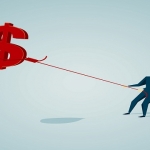While I never have seen a survey inquiring about the desire for investing at the perfect time, I am pretty confident that if the question were asked “Would I like it if I could identify the PERFECT time to invest?” I am confident that the answer would be a resounding YES! At the same time, isn’t that exactly what all the scam artists use to defraud investors? Our desire/need to be right all the time? Someone comes along with a great sounding idea about how this is the perfect time or the worst time to invest and have a strategy to take advantage of that situation?
Of course, given a choice of being right or wrong, we all want to be right! At the same time there are so many ideas that “sound like” they are right but at the same time, the evidence proves them wrong. Market timing is the clearest choice of something that sounds good but at the same time seldom works out. Yes, people do get lucky from time to time but most of the time get it wrong. Why? Their emotions get in the way. Yep, those old emotions of fear and greed.
For example, take Fred and Sally. Fred and Sally were excellent savers and have amassed a nice sum of two million dollars. In the crash of 2008, Fred and Sally couldn’t stand seeing their hard earned savings decline. At one point when the portfolio was worth $1,200,000 they got scared and decided to “pull the plug”. That was March of 2009. Exactly the worst time because the market bottomed out at that month.
Of course, they now thought that they saw all the signs. High home prices, S&P 500 at highs, valuations expensive. How could they have seen all that and not pulled the plug earlier? Of course, they didn’t see the signs. Few, if any, did see it and if they did, they pulled out way too soon and then didn’t get back in at the bottom like they said they would.
A better strategy for Fred and Sally would be to assure their portfolio could actually be held for the long term instead of feeling they were forced out due to their fear. Adequate cash reserves is a key component to retirement success. Too often investors get lulled to sleep with the notion that they do not earn enough on the cash reserve portion of their portfolio. Of course, on the surface this is true. Cash never earns as much in the long term as other asset classes do. NEVER! At the same time, that is not what cash reserves are designed to do. We suggest that retirees have 18-24 months of cash in reserve for expenses. When the market goes down this will be an important resource to draw upon during the tough times. In most cases the markets recover in 12-24 months allowing your capital to provide the returns that are necessary to meet long-term needs and hedge against inflation.
What if your retirement projections aren’t as attractive holding that much cash? That may be a signal that you may not be ready for retirement yet or you need to adjust your expectations for cash withdrawals from the portfolio. Most people are not able to meet a retirement need that may last 30 years plus without investments beyond fixed income. At the same time few retirees can successfully navigate having their portfolio 100% invested and the ups and downs of the markets, emotionally or practically.
There are four key factors to successful investing:
- Valuations
- Costs
- Volatility
- Tax Effectiveness
By focusing on the four items above and having adequate cash reserves to meet short-term needs, regardless of market conditions, the probabilities of success increase significantly.
To learn more about Bob Klosterman, view his Paladin Registry research report.
Other posts from Bob Klosterman
Investors Hungering for an Inside Scoop
It’s sooooo NOISY out there! People don’t have a good intuitive sense of how to weigh new information in...
Things That Matter to Investors
Many of the comments we received from clients, friends and acquaintances express frustration with the current economic and...
How do Real Investors Take a Punch?
Ancient Chinese Curse….May you live in interesting times With little question we live in interesting times and the...





